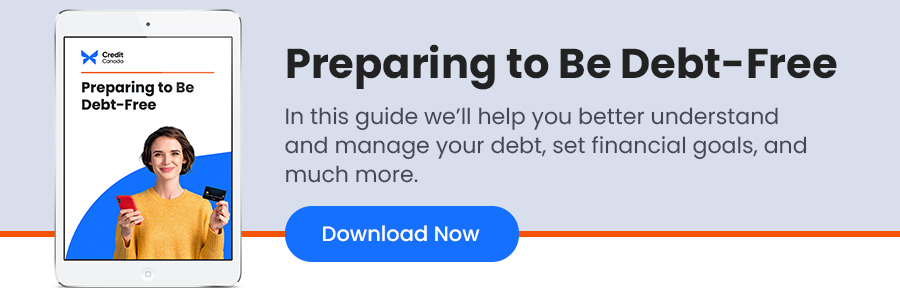
How a Credit Counsellor Can Help You Become Debt-Free
Do you know that song, “You’ve Got a Friend” by Carole King? There’s a point in it that mentions calling someone, no matter what time of year it is. Well, the same is true about debt.
There’s so much confusion about what to do about it and who to go to for help. We also might feel some shame around how we got into debt in the first place.
The truth is most of us weren't taught anything about financial literacy in school, so we were forced to figure it out alone as adults. And it’s easy to get overwhelmed.
Budgeting takes time, inflation is unavoidable, and for most people, money management is intimidating even for just one month, let alone planning for an entire year.
Sometimes, you need a little support to manage your finances, especially if you’re dealing with debt.
Why You Should Call a Non-profit Credit Counsellor
So, what does that support look like? Whether it's through increased accountability on your budget, debt consolidation guidance, learning about all your debt-relief options, or just having an empathetic ear — a non-profit Credit Counsellor can make all the difference in jumpstarting your finances.
First, they’ll empathize with you and your financial circumstances, because that’s what they do every day. And second, they’ll take you through your options — and there are options!
Credit Canada's skilled non-profit Credit Counsellors are highly rated and experienced in all things debt and finance. They've seen it all and are equipped to help you make tangible plans to pay off your debts and jumpstart your financial health. And they care!
The Reality of Debt Today
Financial literacy is our understanding of financial topics and having the confidence to make financial decisions, like using credit responsibly, making investments, saving for the future, and wise day-to-day spending.
But financial literacy takes effort and discipline. It’s not something that we all grow up with, and it only recently started to appear in school curriculums. As of 2014, a study showed that over 60% of Canadians considered their financial literacy as “poor” or “fair.”
So, what does low financial literacy mean for Canadians? Poor budgeting, high debt levels, and poor use of credit.
How Financially Literate are Canadians?
As of 2019, findings from the Financial Consumer Agency of Canada show that under half of Canadians even have a budget, and 1 in 4 Canadians have to borrow money for daily expenses. We’re also using our credit cards more often, with the average monthly card spend creeping up to $1,400 in November 2021.
How does your personal finance scenario fit into these stats? Well, if you borrow more than you make or notice you’re spending a lot on credit card interest, you’d be in a similar boat as many Canadians today. And, if you’re feeling stressed out or even depressed about your finances — you’re not an outlier there either.
How do you combat this? Self-study and discipline into financial topics is one way. Some of the greatest billionaires in the world are self-taught, and you can do the same with finances. A great place to start is Credit Canada’s Resource Centre.
But when there’s so much to learn, so much to keep track of — it’s okay to need a bit of help. Non-profit Credit Counsellors exist for that reason.
What Does a Credit Counsellor Do?
If you were bad at math in school, your parents might have sent you to an after-school program or hired a tutor. Well, a Credit Counsellor is like a tutor for your debt. And if your Credit Counsellor is from Credit Canada, that tutor is completely free.
A non-profit Credit Counsellor understands that it’s vulnerable and sometimes embarrassing to share your finances with someone. But when it comes to your personal finances, it’s all about confiding in the right person. A non-profit Credit Counsellor is exactly that. They aren’t here to judge, they’re here to help.
Credit Counsellors offer guidance on money management, debt management, and more. Their goal is to help you find the right solution for you, your circumstances, and your financial goals.
A Credit Counsellor can educate you about how to manage debt and improve your finances. They may offer insights about lower-interest options and their requirements, your credit rating and how to improve it, and other resources and support you may be eligible for.
They can also advise you on how to create a debt management plan that fits your income schedule, savings goals, and debt level.
Keep in mind that most non-profit Credit Counsellors are certified as Accredited Financial Counsellors (AFCC) through the Association for Financial Counselling & Planning Education (AFCPE), and have years of experience providing credit counselling services to people just like you.
While self-study is still something you may consider to improve your finances and manage debt, why not make use of a valuable (and free) resource like a non-profit Credit Counsellor, too?
How a Credit Counsellor Can Help You
A non-profit Credit Counsellor is your guide, confidant, and cheerleader for your financial life. They will review money management issues affecting your life and help you find solutions to them. A Credit Counsellor’s one-on-one service gives you specialized attention and tailored debt solutions for your unique financial scenario.
Maybe you’ve been caught up in your spending routine for so long that you can’t see the problem areas anymore. You might not notice the consistent spending on Caramel Balsamic Swirl ice cream each weekend, or the $25 in lottery tickets you spend every week. A Credit Counsellor shines a light on spending habits to help you take control of your financial future.
Sorting out your finances and managing debt can be draining. After a week or so of work, you might be discouraged to continue. But a non-profit Credit Counsellor can check in on you, and offer support and motivation to help keep the momentum of your debt repayment plan going!
Understanding the Power of Community
There’s no way Credit Canada could have ever grown from a small Toronto office to a national, non-profit organization serving thousands of Canadians each year without the power of community.
When people work together, amazing things can happen.
You might see solutions that you couldn’t see before (as the saying goes, ‘You don’t know what you don’t know.’).
You may learn about a government benefit or program that could be the stepping-stone you needed to go back to school for extra training, and finally, make that career jump.
You can learn about a debt solution that works for you, helping you become debt-free and able to start saving for another financial goal, like a downpayment, certification program, or an item you want to cross off your bucket list.
The power of community helps us learn and grow. It’s also vital for our mental health and financial success.
Life can feel crazy and stressful, especially when you're dealing with debt—the option to lean on someone for support speaks volumes for our mental health and emotional stability.
Call Credit Canada for Non-profit Debt Help
Sometimes all it takes is speaking to the right person.
It can light a spark that ignites your entire financial strategy and move your plan into action. Speaking to a Credit Counsellor can help you start achieving whatever goal you might have, whether it’s to become debt-free, save more, build credit, or all of the above.
One thing we always hear from our clients is they wish they would have called us sooner. The relief and peace of mind they feel after speaking to us, in most cases, is instant.
Non-profit Credit Counsellors are an invaluable resource to all Canadians, no matter what their financial scenario looks like. From tailored debt management solutions to an empathetic ear, Credit Counsellors can help you chart a path towards a successful financial future.
Contact Credit Canada’s non-profit Credit Counsellors today—we’d be delighted to help jumpstart your financial health!
Frequently Asked Questions
Have questions? We are here to help
A Debt Consolidation Program (DCP) is an arrangement made between your creditors and a non-profit credit counselling agency. Working with a reputable, non-profit credit counselling agency means a certified Credit Counsellor will negotiate with your creditors on your behalf to drop the interest on your unsecured debts, while also rounding up all your unsecured debts into a single, lower monthly payment. In Canada’s provinces, such as Ontario, these debt payment programs lead to faster debt relief!
Yes, you can sign up for a DCP even if you have bad credit. Your credit score will not impact your ability to get debt help through a DCP. Bad credit can, however, impact your ability to get a debt consolidation loan.
Most people entering a DCP already have a low credit score. While a DCP could lower your credit score at first, in the long run, if you keep up with the program and make your monthly payments on time as agreed, your credit score will eventually improve.
Anyone who signs up for a DCP must sign an agreement; however, it's completely voluntary and any time a client wants to leave the Program they can. Once a client has left the Program, they will have to deal with their creditors and collectors directly, and if their Counsellor negotiated interest relief and lower monthly payments, in most cases, these would no longer be an option for the client.

